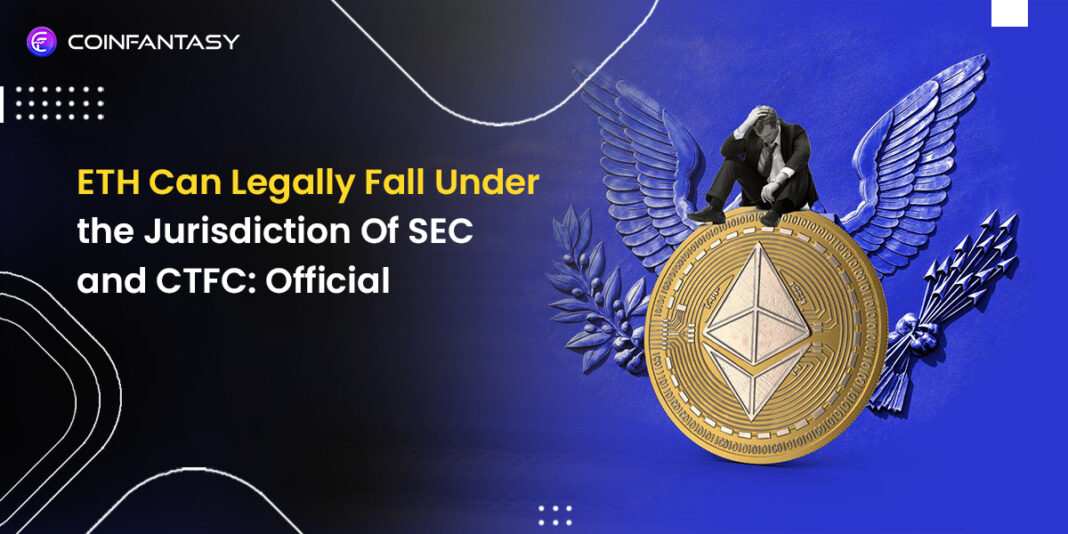According to a former Commodities Futures Trading Commission commissioner, ETH could be legally considered both an asset and a security under the jurisdiction of the SEC and CFTC.
Dan Berkovitz, former chief counsel of the Securities and Exchange Commission, stated on May 23 in a podcast that it is lawfully conceivable for Ether to come within the authority of both regulatory authorities.
Whereas most industry observers would probably disagree that the two are inextricably linked, he explained that the misunderstanding comes from two different U.S. regulatory entities, the Commodity Futures Trading Commission (CFTC) and the Securities and Exchange Commission (SEC). It is probably overlapping responsibilities based on the terms of commodities and securities.
The Basis of the Debate was Two Contradicting Statements
- According to CFTC Chair Rostin Behnam, ETH is a commodity.
- SEC Chair Gary Gensler has proposed that anything except Bitcoin (BTC) could be considered a security. When questioned specifically by Congress, “Is Ether a security?” He did not comment.
Is Ethereum’s Legal Status the Ultimate Issue?
The persistent uncertainty surrounding Ether’s legal status is mostly due to contradictory pronouncements from the CFTC and the SEC. Over the past six months, the CFTC has consistently labeled Ether, as well as several other cryptocurrencies, as commodities.
Meanwhile, the Gary Gensler-led SEC has not formally assigned Ether an authorized class. Gensler stated during a committee meeting in April that all things but Bitcoin should be classified as a security, but has failed to clarify.
As in another case, the SEC submitted a federal complaint towards crypto spokesperson Ian Balina on Monday for failing to officially register a cryptocurrency as a security asset before releasing a 2018 initial coin offering (ICO), all that seemed routine: the SEC has been bringing civil lawsuits on people and companies for beginning unofficial ICOs for a long time.
The participants with keen eyes then look a bit deeper into the tiny print. The SEC stated recently that it has the authority to sue Balina not only because the matter involves trades in the United States, but also because the whole Ethereum ecosystem comes within the scope of the US authorities.
The regulator highlighted in its petition that the ETH delivered to Balina was confirmed by a network of Ethereum blockchain nodes that are far more systematically located in the United States compared to all other nations. As a consequence, the transactions took place within the United States, according to the SEC.
The SEC seems to be arguing that due to the fact the majority of Ethereum’s authenticating nodes are now located in the United States, all transactions made on Ethereum worldwide should be regarded to be of American origin. As reported by Etherscan, the United States now hosts 45.85% of all Ethereum nodes. For instance, Germany has the second-highest number of nodes at 19%.
The SEC was unable to adopt an official view on Ethereum under Gensler, but prior administration officials claimed that Ethereum was adequately decentralized and hence not a commodity. But, if the SEC ever claimed that Ethereum was an unregulated security, Fyre believes the legal system would agree.
The Present Controversy on ETH’s Security and Commodity Flexibilities
Though many might consider the argument that Ether may be a form of security and a commodity in conflict, Berkovitz stated that owing to the overlapped legal descriptions of commodities and securities, an asset could be defined as both.
“The law is simple. A thing that could serve as a commodity as well as a security,” Berkovitz said that the misconception occurs because commodities are not solely material items such as “wheat” or “oats” and that whatever comes within the scope of a futures transaction may potentially be identified as a commodity. This clarifies the reason why the term “futures” is included in the CFTC’s name.
On the other hand, Berkovtiz stated that security, referred to by the Securities Act and the Exchange Act, such as bonds and investment agreements, might additionally be a part of a contract for futures, thereby bringing it within the scope of the CFTC too.
The CFTC’s major administrative scope includes commodity futures and trades, whereas the SEC only manages securities. But if anything serves as a commodity in the viewpoint of the CFTC and a security in the views of the SEC, both governing organizations may have authority in it.
Collin Lloyd, a shareholder at the international legal company Sullivan & Cromwell, focused on the podcast at the SEC’s dispute that all things but Bitcoin should be categorized as a “security” within federal securities law.
“I can’t find anything interesting in the current law that says to me that a sequence of digits operating on a distributed ledger can be a security,” Lloyd stated.
It’s an odd matter to put forward, “Is this digital asset secure or not? Is this digital asset being traded as a component of a securities transaction?” I believe you should ask. “That is determined by the data and context.”
Closing Thoughts
Ethereum is under the jurisdiction of the SEC and CFTC. No one knows what will happen. Each committee is giving different statements about ETH and both are acceptable from their point of view. But the thing is whether the digital asset can become a commodity. As we know that cryptocurrencies are volatile assets, and their price may go up and down at any time. If there is no stable price then how we can determine it as a commodity? On the other hand, if there is any bug in the Ethereum platform, security also comes into concern.

